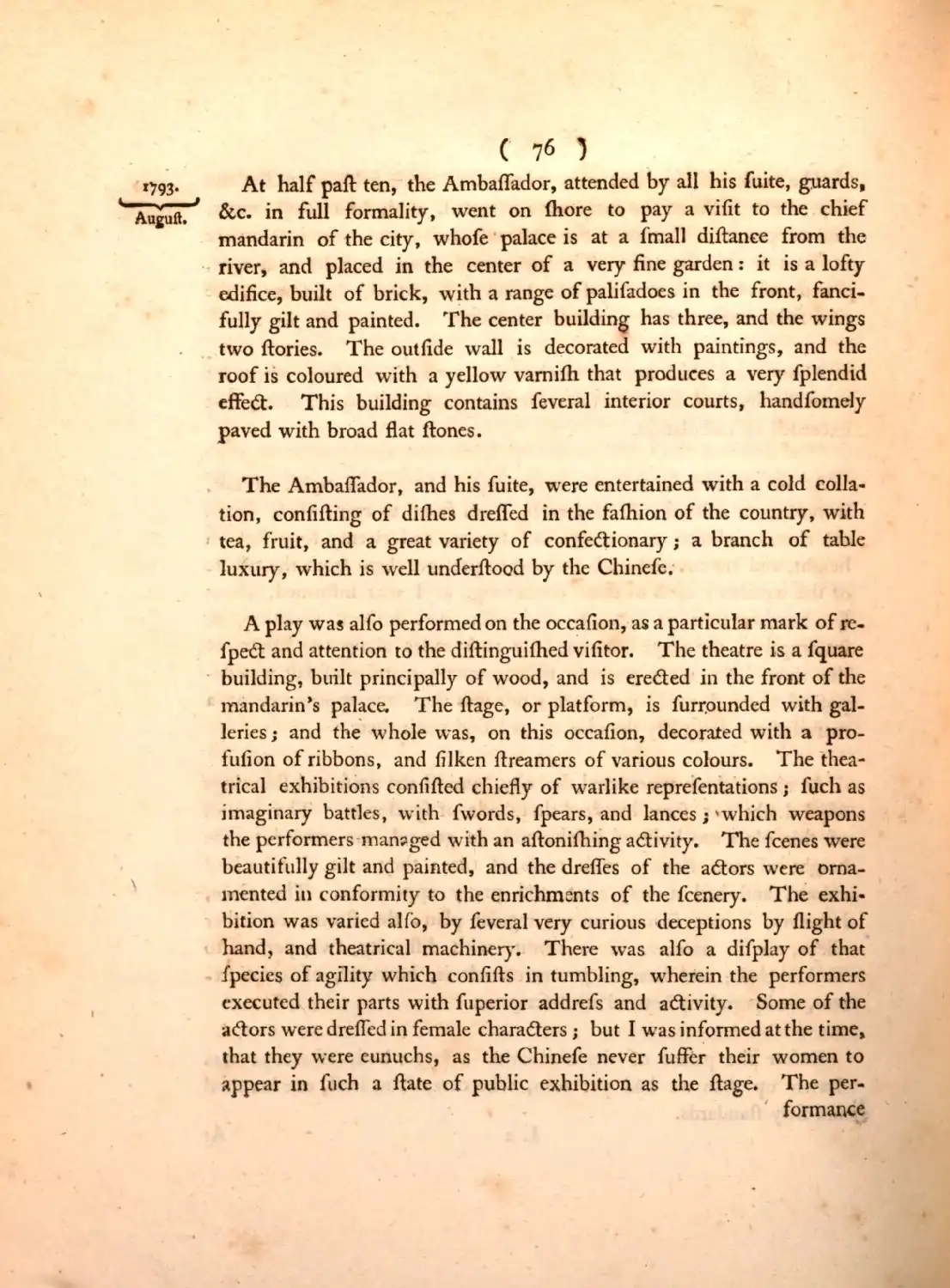A Narrative of the British Embassy to China. 1
- Info
- Pages
- Transcript
- Related
At half past ten, the Ambassador, attended by all his suite, guards, &c.
in full formality, went on shore to pay a visit to the chief mandarin of
the city, whole palace is at a small distance from the river, and placed
in the center of a very fine garden: it is a lofty edifice, built of
brick, with a range of palisadoes in the front, fancifully gilt and
painted. The center building has three, and the wings two stories. The
outside wall is decorated with paintings, and the roof is coloured with
a yellow yarn varnish that produces a very splendid effect. This
building contains several interior courts, handsomely paved with broad
flat stones.
The Ambassador, and his suite, were entertained with a cold collation,
consisting of dishes dressed in the fashion of the country, with tea,
fruit, and a great variety of confectionary; a branch of table luxury,
which is well understood by the Chinese.
A play was also performed on the occasion, as a particular mark of
respect and attention to the distinguished visitor. The theatre is a
square building, built principally of wood, and is erected in the front
of the mandarin’s palace. The stage, or platform, is surrounded with
galleries; and the whole was, on this occasion, decorated with a
profusion of ribbons, and silken streamers of various colours. The
theatrical exhibitions consisted chiefly of warlike representations;
such as imaginary battles, with swords, spears, and lances; which
weapons the performers managed with an astonishing activity. The scenes
were beautifully gilt and painted, and the dresses of the actors were
ornamented in conformity to the enrichments of the scenery. The
exhibition was varied also, by several very curious deceptions by slight
of hand and theatrical machinery. There was also a display of that
species of agility which consists in tumbling, wherein the performers
executed their parts with superior address and activity. Some of the
actors were dressed in female characters; but I was informed at the
time, that they were eunuchs, as the Chinese never suffer their women to
appear in such a state of public exhibition as the stage. The
performance was also enlivened by a band of music, which consisted
entirely of wind instruments: some of them were very long, and resembled
a trumpet; others had the appearance of French-horns, and clarinets: the
founds of the latter brought to my recollection that of a Scotch
bag-pipe; and their music, being destitute both of melody and harmony,
was of course, very disagreeable to our cars, which are accustomed to
such perfection in those essential points of music. But we had every
reason to be satisfied with the entertainment, the circumstances of
which were replete with novelty and curious amusement.
The dress of the soldiers was, with their arms and accoutrements, the
fame as those which we have already described, except in the colour,
which was both white and blue, though equally bound with the same broad
red binding: some of them, on the present occasion, were employed, with
long whips, to keep off the crowd from pressing on the procession of the
Ambassador and his suite.
His Excellency was saluted, both on his arrival and at his departure,
with three pieces of small ordnance: and, soon after his return to the
vessel the fleet set sail, amidst the greatest concourse of boats and
people I ever beheld: – indeed, so great was the crowd of both, that I
considered it to be impossible for us to pass on without being the
witnesses of considerable mischief. One very old junk that lay at anchor
had such a number of people on board it, to see the extraordinary fight
of the day, that the sternmost part of the deck yielded to the enormous
pressure, and suddenly gave way, when about forty of these curious
people fell into the river, and several of them were unfortunately
drowned. Some were, indeed, saved by clinging to the ropes which were
thrown out to them; though it was very evident to those who witnessed
the accident, that curiosity rather than humanity prevailed on the
occasion; and that the people were more anxious to get a fight of the
foreigners, than to save the lives of their countrymen.

